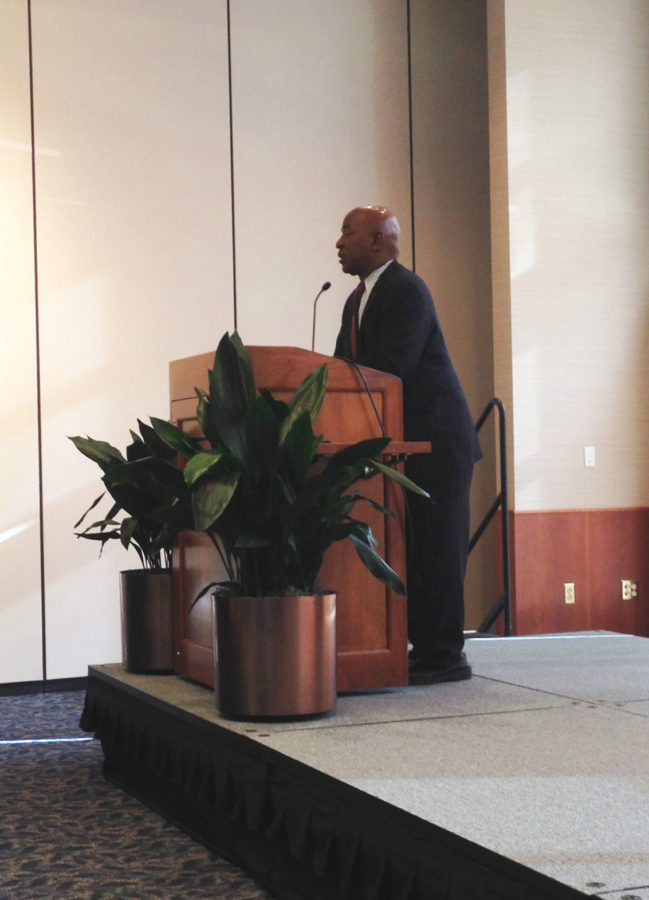Harvard Law Professor talks civil rights, Ferguson
Harvard Law School Professor Charles Ogletree gave a talk at the Alice Campbell Alumni Center Wednesday about civil rights, police brutality and what comes next.
Dec 4, 2014
Last updated on May 10, 2016 at 11:23 p.m.
In light of recent outrage in Ferguson, Missouri and around the country, Harvard Law School Professor Charles Ogletree gave a talk at the Alice Campbell Alumni Center Wednesday about civil rights, police brutality and what comes next.
“We have to keep our feet on the ground,” Ogletree said. “Keep marching. Because there are a lot of folks that you probably don’t even know and a lot of folks that I don’t know who sacrificed for the right to end racial segregation — for the right to make sure that we could eat at a restaurant, we stay at a hotel, we drink at any water fountain.”
Ogletree said he has been very impressed by the students at the University and their march on Tuesday, which responded to the grand jury decision not to indict police officer Darren Wilson for the death of Michael Brown. He participated in a similar march with his students at Harvard.
“It was so impressive to see young people taking the lead and saying that we are going to march and make sure that happens. That hasn’t happened in a long time,” he said.
Get The Daily Illini in your inbox!
Ogletree discussed the Ferguson case during the question and answer period following his lecture.
After Brown’s death, Ogletree believes Wilson should be arrested and indicted. However, he did not think Wilson would be indicted because he’s a police officer, who Ogletree said are rarely indicted.
He said the prosecutor’s job is not to convict, but to do justice. In this particular instance, he said there is a “love-fest between the prosecutor and Officer Wilson.”
Ogletree mentioned it was wrong that the prosecutor used Wilson as his witness and that as the defendant, Wilson talked to the grand jury for four hours. He said that there is still the possibility that Wilson will be sued civilly. The legal team representing Michael Brown’s family have approached Ogletree, and he said he was “absolutely willing to join the team.”
Four students in attendance participated in the march the previous night. One asked Ogletree how to make sure that this movement and emotion don’t “blow over” like in other cases, as well as how to stress the importance of the situation to others.
“I think you have to be present, you have to be visible, you have to increase the numbers,” he said. “Maybe just increasing (those involved) from three to six, or from six to 12, or 12 to 24, whatever, you have to make sure that happens.”
Ogletree said the next movement needs to be bigger and different. He said that people may say why they don’t want to participate, but others will also say they were never asked; he stressed figuring out how to draw these people in.
The situation in Ferguson wasn’t the only example brought up during the lecture, he also mentioned cases like Trayvon Martin and Emmett Till.
“I keep trying to think, well I’m going to go to an area where it hasn’t happened, let me go here,” Ogletree said. “But everywhere you go what happened in Ferguson is happening in Chicago, has happened in California, has happened in New York, has happened in Washington D.C., happened in Massachusetts. You can’t think of a state where we don’t see people are treated differently based on their race.”
An audience member also asked for Ogletree’s thoughts on the Eric Garner case, in which Garner died as the result of being placed in a chokehold by a white New York police officer while trying to arrest him for pedaling cigarettes.
Ogletree said there should be an indictment and the community needs to get out and demand justice.
That afternoon, news broke that there would not be an indictment and that Officer Daniel Pantaleo was cleared.
Ogletree ended his lecture by quoting something he heard in church when he was younger.
“I don’t feel no ways tired because I’ve come too far from where I started from,” he said. “And nobody told me that the road would be easy. I don’t believe He brought me this far just to leave me.”
Andrew can be reached at [email protected].






